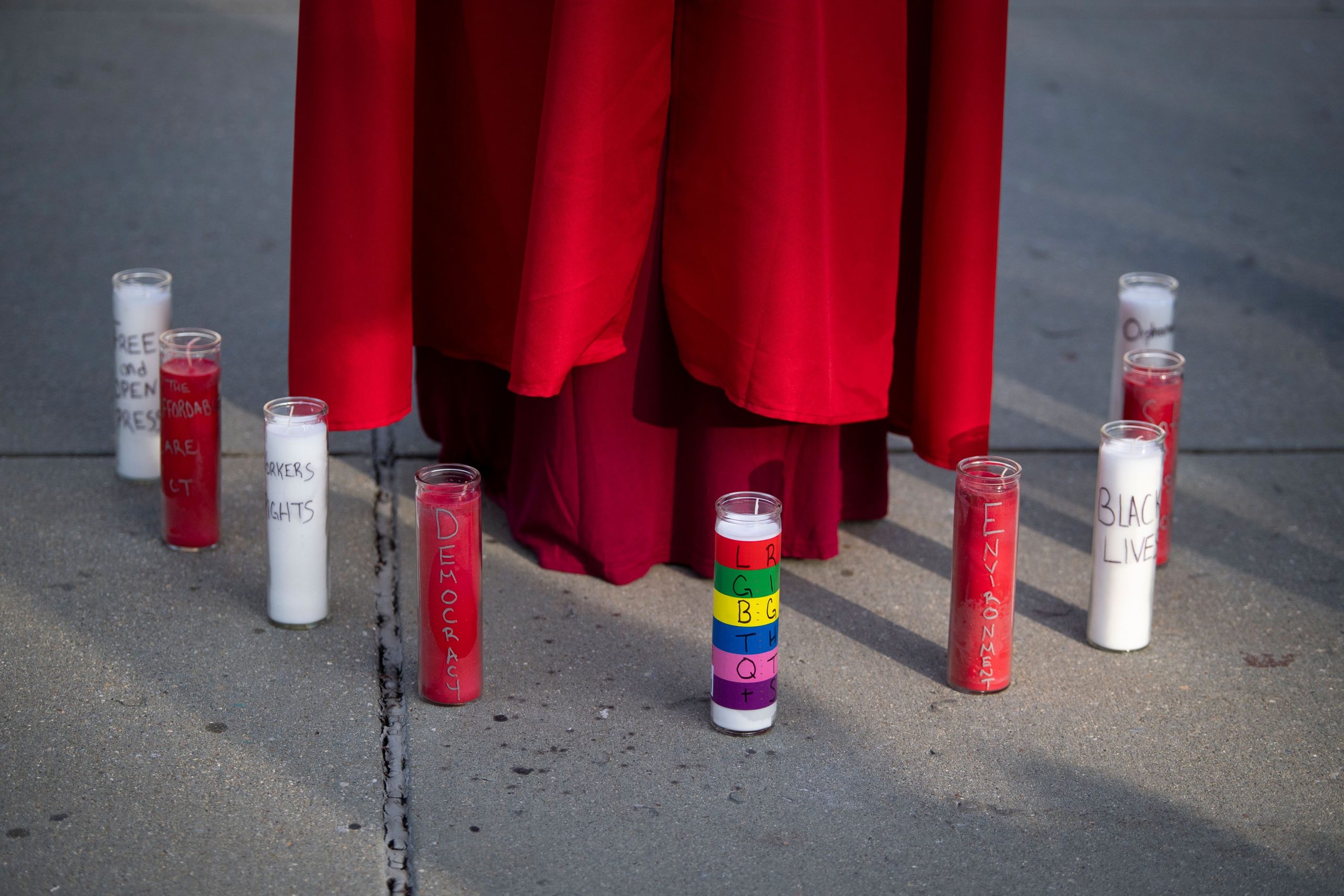

Behind the closed doors of an unassuming philanthropic consultancy in Washington, D.C., is one of the most powerful lobbying forces in the United States. The Atlantic has called it “the massive progressive dark-money group you’ve never heard of” and “the indisputable heavyweight of Democratic dark money.” The Washington Post believes its potent lobbying arm is reason enough for Congress to enact forced donor disclosure laws, while Politico labelled it a “dark-money behemoth.” “The system of political financing, which often obscures the identities of donors, is known as dark money,” wrote The New York Times, “and Arabella’s network is a leading vehicle for it on the left.”
Meet Arabella Advisors, the brainchild of ex-Clinton administration staffer Eric Kessler and the favorite tool of anonymous, billionaire donors on the progressive left. Since 2006, the Arabella hub has overseen a growing network of nonprofits—call them the “spokes”—that collected $2.4 billion in the 2019-20 election cycle, nearly twice as much as the Republican and Democratic national committees combined.
These nonprofits in turn manage and supervise a vast array of “pop-up” groups—mainly political attack-dog websites, ad campaigns, and “spontaneous” demonstrations staffed by Arabella’s network of activist professionals who pose as members of independent activist organizations. These groups—such as Fix Our Senate, the Hub Project, and Floridians for a Fair Shake—typically emerge very suddenly in order to savage the political opposition on the policy or outrage of that particular day or week, then vanish just as quickly. The pop-ups do not file IRS disclosures or report their budgets, boards, or staff. In most cases, their connection to Arabella goes unreported. Many of them have offered sympathetic ordinary voters the opportunity to donate to whatever the “grassroots” cause happens to be, when in fact the money feeds back into Arabella’s enormous dark-money network.
The relatively novel and innovative model of political activism perfected by Arabella, which was founded 2005, went more or less unnoticed until 2018, when I was reporting on the activist groups that attempted to prevent the Senate confirmation of Supreme Court Justice Brett Kavanaugh. Among the sea of picket signs outside the court in July 2018 was the name of an unfamiliar group: Demand Justice. A search of the IRS nonprofit archives showed the name itself wasn’t listed. What did turn up in an online search was a downtown address on Connecticut Avenue shared by dozens of other organizations, including the Arabella “spoke” that appeared to be running Demand Justice, Sixteen Thirty Fund.
It isn’t uncommon for political groups to share expensive D.C. office space, especially when they’re affiliated, like the Center for American Progress (CAP) and its lobbying arm, CAP Action. But Arabella’s arrangement is unique: A for-profit consultancy (Arabella Advisors) is the central hub; four (perhaps five) tax-exempt nonprofits (New Venture Fund, Sixteen Thirty Fund, Hopewell Fund, Windward Fund, and possibly North Fund, all founded and led by Arabella leadership) are the spokes; and countless ephemeral pop-ups branching out from the nonprofits.
In early 2019, the Capital Research Center (where I work) released a report on the network. Since then, my colleagues and I have collected large amounts of data on Arabella’s origins, lobbying, pop-up campaigns, board connections, and donors, which helped lay the groundwork for later reporting on Arabella in mainstream outlets like The Atlantic and New York Times—which have since acknowledged that the political “left” has outraised and outspent the political “right” using dark money in recent years by a margin of nearly 2 to 1.
And yet today, the vast majority of American voters remain unaware of Arabella’s existence, even as it promises to play an increasingly central role in American politics, and as the culture wars and fight for control of federal institutions reaches a fever pitch in the fall of 2022.
Before Arabella Advisors, there was Eric Kessler. Today he is the company founder, principal, and senior managing partner, and at one point served as a board member for four of the Arabella network’s five nonprofits. Kessler is considered by many in Washington to be a leading expert on philanthropy and foundation-giving.
Kessler’s career began over 30 years ago not in philanthropy but in grubby political activism. In 1990, he was a student at the University of Colorado where he met David Brower, founding director of the Sierra Club and a population-control advocate who created the environmental groups Friends of the Earth and the Earth Island Institute, among others. Over Tanqueray martinis, according to the Earth Island Journal, Brower convinced Kessler to hitchhike to San Francisco as an Earth Island volunteer focusing on water conservation problems in Siberia.
In 1993, Kessler became national field director for the League of Conservation Voters, a powerful environmental lobbying group—also founded by Brower in 1970—that spends heavily on boosting Democratic turnout each national election cycle. In 1996, following successful campaign work, Kessler was appointed to President Bill Clinton’s Department of the Interior under Secretary Bruce Babbitt, an aggressive regulator who had run the League of Conservation Voters from 1988-93. From 1999 to 2005, Kessler was senior manager of the National Democratic Institute for International Affairs, which promotes a progressive vision of democracy in developing countries (he now serves on the board).
The crucial turn in Kessler’s life came in 1998, when his family sold its fifth-generation auto parts company in Chicago, Fel-Pro, for a reported $750 million. At 26 years old, Kessler had become quite wealthy. He got involved in his family’s charity, the Family Alliance Foundation, a modest grant-maker to health care research whose board still includes him and his parents.
In 2005, Kessler left the National Democratic Institute for International Affairs to found Arabella Advisors. While it remains unclear exactly what inspired it, the company’s current business model—a for-profit hub that directly controls a series of nonprofit spokes—was visible at the beginning. Almost immediately after Arabella was formed, Kessler started the 501(c)(3) Arabella Legacy Fund, now called New Venture Fund, the largest nonprofit in the Arabella network.
The Arabella hub has since added three more spokes—the 501(c)(3) Hopewell and Windward Funds and 501(c)(4) Sixteen Thirty Fund—and perhaps a fifth, semirelated (c)(4) sibling, North Fund, which shares common characteristics. All except North Fund share the same address. (It’s perhaps worth noting that in 1630, when the Puritan John Winthrop and his followers departed England for Massachusetts, a new venture that led to the founding of Boston, they traveled aboard the ships Arabella and Hopewell. “Windward” is likewise a nautical term.)
Why so many nonprofits? There are advantages in shuffling money around and having multiple different pots to collect cash from different donors. Windward Fund appears more focused on environmental causes, while Hopewell supports many of the network’s pro-abortion rights campaigns. The Sixteen Thirty Fund was created with seed funding from the Sierra Club and the radical defunct group ACORN, among others. In turn, the Sixteen Thirty Fund appears to have provided seed capital for the North Fund in 2019, which almost exclusively provides money to state ballot initiatives. If nothing else, this arrangement makes the money harder to follow.
Arabella Advisors itself makes its money from client consulting fees—typically from wealthy donors and left-leaning foundations—and management fees charged to its nonprofit network. The company likes to convey the impression that, as outgoing Arabella CEO Sampriti Ganguli said, according to an Atlantic report, it’s a “relatively small business-services organization that does HR, legal compliance, etc.” for the nonprofits that just happen to share its address and hire Arabella for contract work—$182 million of it for pop-up campaign staffing, office space, and similar services between 2008 and 2020.
Strictly speaking, Ganguli’s description is accurate. But it also helps obscure the reality of how large and active the network really is.
Kessler at one point served on the boards of all four main “spokes” alongside the company’s general counsel and CFO. Although they’ve since expanded board membership beyond Arabella itself, New Venture Fund, the largest spoke, is still led by ex-Arabella managing director Lee Bodner. Furthermore, many of Arabella’s pop-up campaigns have two components: Lobbying, run through Sixteen Thirty Fund, and research or fundraising, run through one of the (c)(3) spokes. In short, the incestuous nature of Arabella’s network is a feature, not a bug, of its business model. It is, moreover, a prime selling point to donors. So why hide it?
It’s possible to observe money entering the Arabella pot and money leaving it, but there is no way to connect any particular grant to any individual donor.
From a donor’s perspective, the Arabella network may offer a way to direct large amounts of money into favored political causes while minimizing outside scrutiny.
The IRS requires 501(c) nonprofits to file annual Form 990 disclosures revealing budgets, boards, and any grants paid out. But only private foundations must publicly report their donors—making it easy to trace a donation, for example, from Warren Buffett to the Buffett Foundation to Planned Parenthood.
Alternatively, by routing financial contributions through the New Venture Fund, and then on to the final recipient, that donor’s name is washed away. His or her contribution is pooled with money from other donors and later paid out as New Venture Fund grants. In other words, it is possible to observe money entering the Arabella pot and money leaving it, but there is no way to connect any particular grant to any individual donor.
In 2020 alone, the “spokes” paid out $896 million this way, virtually all of it to politically active organizations.
Private foundations are also barred from election intervention and, with certain exceptions, from donating to 501(c)(4) groups like the Sixteen Thirty Fund, since the latter are allowed to spend significantly more money on lobbying than their (c)(3) counterparts and may engage in limited electioneering, such as campaign ads and endorsements. Donations to 501(c)(4) groups are not tax-deductible, unlike their (c)(3) counterparts. When a donor gives to a (c)(4), it’s typically for lobbying or electoral purposes.
The bulk of the Arabella network’s revenues come from foundation contributions, which is all the more notable given how much money circulates internally between the spokes—roughly $103 million in 2020. Did foundation money end up supporting Sixteen Thirty Fund’s election work in past elections? It’s impossible to tell. But money is fungible; foundation grants may not have been used for lobbying, but it’s not hard to see how they can free up other Sixteen Thirty Fund money for political work.
In the first quarter of 2022, for example, Sixteen Thirty Fund spent $2.3 million lobbying Congress on drug pricing caps in the Build Back Better bill, “election integrity,” and “filibuster reform.” Since 2020, Sixteen Thirty Fund has spent $7.8 million lobbying Congress on annual appropriations bills, statehood for Washington, D.C., the CARES Act, “Senate rules reform proposals,” Medicaid expansion, and the For the People Act (H.R. 1).
Critics have likened this practice to charitable “money-laundering” for washing away the identity of donors, but it isn’t unique to Arabella or to the political left: The more famous Tides Foundation in San Francisco pioneered pass-through grants in the late 1970s, while DonorsTrust offers a similar “dark money” service to conservatives.
A deliberately ominous but squishy term coined a decade ago by the left-leaning Sunlight Foundation to criticize anonymous spending by conservative groups in the 2010 midterm elections, “dark money” is today widely used to disparage one’s political opponents in general. Sheldon Whitehouse, D-R.I., the Senate’s top “dark money” hawk, has compared the anonymous spending of groups he disagrees with to treason—while ignoring the $3.7 billion in “dark money” that benefited groups he does agree with in 2020 alone.
In 2020-21, the Sixteen Thirty Fund curiously spent roughly $2.9 million lobbying for congressional Democrats’ “For the People Act” (H.R. 1), which would strip donors of their anonymity, currently interpreted as a right protected under the First Amendment. Director Amy Kurtz claims H.R. 1 is part of Sixteen Thirty Fund’s goal to “reduce the influence of special interest money in politics.” Yet when asked to discuss her own group’s donors, Kurtz hid behind the First Amendment, telling Politico that “we remain equally committed to following the current laws to level the playing field for progressives in this election and in the future.”
Similarly, when the $5 million it poured into Montana’s pro-marijuana legalization campaign in 2020 raised questions from state regulators, North Fund refused to violate its donors’ free speech rights: “North Fund strictly follows all disclosure requirements at local, state and federal levels, and donors decide for themselves whether to disclose their contributions.” When pressed to name the donors to its campaign for D.C. statehood, a North Fund spokeswoman told reporters, “We don’t disclose the names of our funders.” (In fact, nearly half of the North Fund’s 2020 revenues, and 100% of its 2019 revenues, came from other Arabella nonprofits.)
In November 2021, The Atlantic’s Emma Green put the obvious question to Ganguli, Arabella’s CEO at the time: “You might call [Arabella’s] work political … Why should people with a lot of money be able to do this anonymously?”
Green: You spend your days serving the interests and needs of billionaires. Also, theoretically, you’re part of a progressive world that thinks that’s wrong and unjust. … I wonder if you think it is okay for groups like this to be able to operate under the cover of darkness.
Ganguli: That is what the law allows for. When the laws change, we will make sure we are perfectly compliant with them. Projects and donors have every opportunity to share publicly what they do and don’t do. It’s not incumbent on Arabella Advisors to opine on what that should be.
After enough prodding, Ganguli appeared to concede that Arabella is no different than one of the most persistent and salient boogeymen among political progressives:
Green: You both take advantage of similar legal structures, federal regulations, and the ability to put lots of money toward politics, little p. They just work on the opposite side, for opposite causes. Do you feel good that you’re the left’s equivalent of the Koch brothers?
Ganguli: Yeah.
When historians look back on this period in American political history—what they might think of as the second Gilded Age—they could do worse than to consult the list of top foundation donors to the Arabella network’s flagship, New Venture Fund, between 2009 and 2022.
There’s no comprehensive list of donors to Arabella’s nonprofits, but all nonprofits are required to publicly disclose to whom they contribute. Over the years, it has been possible to trace grants to Arabella’s 501(c)(3) nonprofits from the Bill and Melinda Gates Foundation ($375 million), Ford Foundation ($125 million), Intel co-founder Gordon Moore’s Moore Foundation ($113 million), Warren Buffett’s Susan Thompson Buffett Foundation ( $111 million), William and Flora Hewlett Foundation (of Hewlett-Packard fame; $71 million), Robert Wood Johnson Foundation (Johnson & Johnson co-founder; $54 million), the Rockefeller Foundation ($43 million), W.K. Kellogg Foundation (Kellogg’s cereal; $37 million), David and Lucille Packard Foundation (Hewlett-Packard’s other co-founder; $33 million), and the John and Catherine MacArthur Foundation (an insurance and real estate mogul; $24 million).
Foundations are generally barred from funding 501(c)(4) nonprofits’ activities, since the latter may spend more on lobbying than their (c)(3) counterparts and may even endorse candidates (foundations and (c)(3) groups may not). In practice, this means the 501(c)(4) Sixteen Thirty Fund’s donors are more obscure. We’ve traced grants from the get-out-the-vote group State Engagement Fund “to support nonpartisan voter engagement and mobilization” in the 2018 election; the National Education Association; eBay founder Pierre Omidyar’s Democracy Fund Voice; AFSCME, a government employees union; Planned Parenthood; Tides Advocacy, associated with the Tides Foundation; and George Soros’ Open Society Policy Center. Any contributions from individual donors are impossible to find, because they won’t appear on any IRS disclosure due to privacy laws.
It’s generally impossible to connect these specific donors with the grants ultimately paid out by the Arabella network. In other words, we can see money going into the nonprofits—though not all of it—and money exiting them, but we can’t link those specific dollars together. It’s a gigantic, multi-billion-piece jigsaw puzzle in which you’re never certain how many pieces are missing from the set. But what’s obvious is that when many of these foundations want to quietly fund political causes, they turn to Arabella—particularly during election years.
In 2020 alone, New Venture paid $44 million to America Votes, which bills itself as the “coordination hub of the progress community”; $25 million to the Center for Tech and Civic Life, which reportedly used $350 million from Mark Zuckerberg to boost Democratic turnout in key cities; $5 million to the Voter Registration Project, which targets likely Democratic voters in battleground states; and $2.3 million to State Voices, which runs a network of get-out-the-vote groups.
The smaller Hopewell Fund directed $8 million in 2020 to ACRONYM, the voter registration group whose infamous app, Shadow Inc., was responsible for screwing up the Iowa Democratic caucuses in 2019, causing the Iowa Democratic Party chairman to resign. It also gave millions to other get-out-the-vote groups, including Stacey Abrams’ Fair Fight Action.
In 2020, Sixteen Thirty Fund paid out $129 million to America Votes; $15 million to Future Forward USA Action and $7.5 million to its political action committee (PAC); $10 million to Bill Kristol’s Defending Democracy Together; $4.5 million to the Democratic super PAC Priorities USA Action; and $3.5 million to the League of Conservation Voters, Eric Kessler’s old employer, to name just a few.
All told, Sixteen Thirty Fund paid $44 million into partisan PACs in the 2020 election, including $11.3 million to two PACs aligned with then-candidate Joe Biden—Victory 2020 and Unite the Country—making Sixteen Thirty Fund their largest and second-largest donor, respectively. Victory 2020 was run by a former chief of staff to Democratic operative David Brock’s Media Matters for America.
In Colorado, Sixteen Thirty Fund ran a $4 million campaign to unseat Republican Sen. Cory Gardner under the name “Rocky Mountain Values,” which described itself as an “organization made up of real Coloradans—not special interests.” (Gardner lost reelection.) In Arizona, Sixteen Thirty Fund pumped $4 million into “Honest Arizona,” a 501(c)(4) formed six months before the November election and led by an activist tied to Majority Forward, itself an affiliate of the Democrats’ Senate Majority PAC in Washington, to defeat Republican Sen. Martha McSally. (McSally also lost reelection.)
In Maine, Sixteen Thirty Fund gave $3.9 million to “Maine Momentum,” a campaign to defeat Republican Sen. Susan Collins that claimed to be “totally Maine-based” until local and national reporting revealed that its money came from Washington, D.C. In Iowa, the self-described “grassroots” group Iowa Forward used Sixteen Thirty Fund cash to campaign against Sen. Joni Ernst for “voting to gut our health care.” In North Carolina, Sixteen Thirty Fund gave $7 million to Piedmont Rising (based in Philadelphia, despite its name), which spent $1.2 million opposing Republican Senate candidate Thom Tillis. (Collins, Ernst, and Tillis all won their elections.)
In 2019, Sixteen Thirty Fund provided $9.3 million to North Fund, which appears to be the Arabella network’s mysterious new fifth spoke. In 2020, the Sixteen Thirty and New Venture Funds together gifted North Fund $30.5 million, approximately half its budget. North Fund in turn paid Arabella Advisors $942,000 in consulting fees that year. The original donors in this case, as in all others, remain unknown.
Saurabh Gupta, Arabella’s general counsel, sits on North Fund’s board. The group is led by Jim Gerstein, a Democratic consultant for GBAO Strategies who previously headed Democracy Corps, the polling outfit created by legendary Democratic strategists James Carville and Stan Greenberg.
In 2020, the North Fund committed $1.1 million to the successful defeat of Colorado’s proposed 22-week abortion ban. The Sixteen Thirty and North funds together provided $7 million of the $9 million campaign to pass the state’s paid family medical leave legislation, which succeeded; their opponents spent less than $800,000.
In Missouri, North Fund put at least $1.1 million into a campaign to defeat Republican-proposed changes to the state’s redistricting process and campaign finance laws, which lost, and an unknown amount into Missouri’s pro-Medicaid expansion campaign, which passed. In Ohio, North Fund gave $1.7 million to an unsuccessful bid to raise the state minimum wage to $13 per hour.
North Fund gave $7 million to Future Forward USA, a nonprofit whose super PAC spent $29 million supporting the presidential candidacy of Joe Biden. It also gave $250,000 to Yes on National Popular Vote, a group pushing states to bypass the Electoral College by giving their electoral votes to whichever candidate receives the most votes nationwide. And it gave $100,000 to LUCHA, an Arizona group whose staffers harassed Democratic Sen. Kyrsten Sinema in an Arizona State University bathroom in October 2021 for her lack of support of President Biden’s Build Back Better Act.
Needless to say, North Fund is pouring millions of dollars into 2022 Senate races. The group launched a $4 million ad campaign called Opportunity Wisconsin to run negative ads against Republican Sen. Ron Johnson, making it one of the top-spending outside groups in the state for a seat Democrats aim to flip in November.
North Fund also appears to house many of the Arabella network’s most extreme pop-ups, its network of transitory and difficult-to-trace campaigns.
North Fund runs 51 for 51, the campaign to grant statehood to the District of Columbia, which would grant two additional Senate seats to the Democratic Party. Just Democracy, another North Fund pop-up, advocates for abolishing the Electoral College, ending the Senate filibuster, and court-packing. Voting Rights Lab Action opposes anti-election fraud measures, while the Democracy Docket Action Fund has financed state-level gerrymandering campaigns meant to give Democrats an edge in future races. North Fund’s Accountable Tech campaign advocates for censorship of conservative “disinformation” on social media platforms. Accountable Tech opposes Elon Musk’s embattled purchase of Twitter, claiming his reinstatement of banned conservatives will “further toxify our information ecosystem and be a direct threat to public safety.”
These types of pop-up groups have been a feature of the Arabella network from the beginning. The name of the first pop-up remains elusive, but we know it aimed to convince conservative evangelical churches to adopt progressive environmental ideology around global warming and carbon reduction policies. Dubbed Creation Care, the goal was to build a “grassroots movement of Evangelicals” using an “environmental toolkit for pastors … to integrate creation care teaching into their ministry” and sermons:
Worship materials will be created for various topics, including global warming, air and water pollution, endangered species and the environment’s effect on human health. … In addition, the Pastor’s toolkit will include materials … to educate Pastors regarding creation care’s basis in Scripture, as well as fact sheets for Pastors and their congregations on various environmental topics and suggestions for how congregations can take action to care for God’s creation.
Creation Care turned out to be something of a well-funded failure, garnering $2 million—$240,000 from the William and Flora Hewlett Foundation and another $494,000 from Patricia Bauman, who is tied to the Democracy Alliance, which coordinates spending to boost Democratic turnout.
Since then, Arabella’s pop-up campaigns have grown more sophisticated. Demand Justice, Arabella’s most famous pop-up alumnus, can perhaps claim more credit than any other group for mainstreaming the revived campaign to pack the Supreme Court and the unsuccessful but landmark campaigns to prevent Senate confirmation of Justices Brett Kavanaugh and Amy Coney Barrett.
Demand Justice, which has since spun off as an independent nonprofit, was formed in 2018 and led by the activist Brian Fallon, who previously served as press secretary of Hillary Clinton’s 2016 presidential campaign. Public filings also list Ezra Reese of Perkins Coie, a law firm aligned with the Democratic Party, as a beneficial owner.
Demand Justice was the group initially responsible for providing protesters dressed in costumes from A Handmaid’s Tale outside the Supreme Court to protest Kavanaugh’s confirmation hearings and purchased the website StopKavanaugh.com.
The group was in fact prepared to protest whomever Trump planned to name to fill the Supreme Court seat previously occupied by Anthony Kennedy. At one of these rallies in July 2018, I noticed and photographed unused pre-printed signs protesting the four potential picks that at the time remained on Trump’s shortlist. Another former Arabella pop-up, Fix the Court, purchased the website BrettKavanaugh.com and filled it with links to sexual assault support groups.
Demand Justice maintains its own shortlist of favored judges, which included Ketanji Brown Jackson before she became associate justice of the Supreme Court. Jackson’s rapid ascent from a district court to the U.S. Court of Appeals to the U.S. Supreme Court all in less than one year received a $1 million lobbying assist from Demand Justice.
At least two former Demand Justice staff members were hired by the Biden White House: senior counsel Paige Herwig, a former Demand Justice deputy chief counsel, and former press secretary Jen Psaki, a Demand Justice communications consultant who advised its get-out-the-vote project, Supreme Court Voter.
Arabella Advisors has recently denied any association with Demand Justice, pointing out that the latter is an independent, unaffiliated nonprofit as of the Jackson confirmation process. In fact, Demand Justice was a project of Sixteen Thirty Fund for three years until mid-2021, when it received its own tax exemption as a separate 501(c)(4). In other words, Arabella’s attempt to deflect association with Demand Justice since Jackson’s nomination appeared to confirm Demand Justice’s status as an Arabella-run pop-up during the confirmations of Kavanaugh and Barrett.
The court fights point to a conspicuous feature of Arabella’s network as a whole: Despite the amount of money it can raise and deploy, it’s been able to buy relatively few political victories. And despite billions of dollars in funds and a seemingly infinite supply of professional activists and mega-wealthy donors, the dominant image of Arabella’s political significance is of a handful of people in their 30s dressed up as fictional characters unsuccessfully protesting Supreme Court nominations on weekday mornings.
For now, it seems, no amount of “dark money” can turn evangelical ministers into climate change activists or convince Mainers to get rid of Susan Collins. Perhaps that, if nothing else about Arabella, should give Americans continued confidence in their democracy.
Story cited here.
Scroll down to leave a comment:





